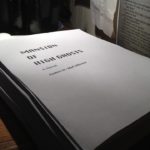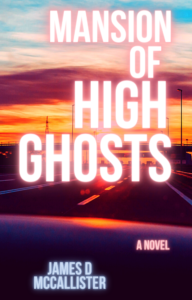Throes of Art-making

Author Reports from the Literary Trenches
Following the completion of Dixiana and its sequels, I took a year off from ‘the chair,’ as Appalachian literary bard Ron Rash would term it, or at least the long-form sort as readers of my poetry saga will recall. I needed a break. The seven-year traverse in writing, editing and publishing an almost 600,000-word epic Southern small town comedy-drama took it out of me. As did life in general during that time.
But in 2021 so far, we’re back. That’s right, I find myself again deep-diving in the eternal well to produce pages.
 The skinny: I’m preparing for the last time a 150,000-word emotional, personal epic of a novel for release, as well as crafting a more modestly-apportioned memoir that’s been simmering in my mind for the last couple of years. Both projects cover any number of interesting, painful, educational terrain; each in their own comprises a deep-sight glance (think about it) back at this vivid life I’ve lived.
The skinny: I’m preparing for the last time a 150,000-word emotional, personal epic of a novel for release, as well as crafting a more modestly-apportioned memoir that’s been simmering in my mind for the last couple of years. Both projects cover any number of interesting, painful, educational terrain; each in their own comprises a deep-sight glance (think about it) back at this vivid life I’ve lived.
Aspiring writers and students take heed, all ye in need of a discipline tune-up: I’m cranking out 1,500-2000 words on the memoir each and every day before seven in the aye-yeem, as well adding more later in the day.
Mid-mornings and afternoons we get into final-polishing the upcoming release of Mansion of High Ghosts, as well doing cover and interior design work on all three upcoming editions (there may also be an episodic trickle-out of its five parts, as happened with Dixiana in 2018).
This routine is what ‘doing the work’ looks like—daily productivity spread across multiple projects in varying stages of completion. It doesn’t have to be epic novels. In whatever discipline you’re working, at whatever scale, just get out of your own way and be productive. Take away the importance and the outcome. Stay in the moment. Neither beckon nor deny. The muse will come.
As will the results—in the last week Shopkeep has doubled in size. That’s twenty-thousand words that almost overnight, it seems, have become 40k.
Make no mistake—my body and soul often writhe in pain from this work, and a massage is in my near future; and yet despite the challenge, I dwell in an ecstatic womb of creativity and inspiration that is my one of my most dear manifestations of the art life that I’ve been blessed to experience. Like Max von Sydow in The Seventh Seal, sitting on the sunlit hillside with the other doomed characters eating the milk and strawberries, “I shall never forget” these rainy February days in which I found my fingers flying again for the first time in what feels like ages.

Writing the childhood section of the memoir has been interesting. Seeing the faces of my loved ones long deceased dead again real and alive sitting here at the table with me as I write about them, or else interacting with the characters of Mansion one final time to make sure this first and most personal of literary works hits every mark just-so, makes this time a ghostly experience indeed.
Today my work most reminds of me not of past travails or tragedies, rather the innocence of childhood that preceded all the emotional or actual horror I’ve witnessed. I wrote today of the family trips to Myrtle Beach that were the literal center of my year the way the penitent view the high holidays. How much fun and love I had with my family. Whatever shortcomings we all shared, I felt so loved and cared for among them. How many people alive right now, in this country or elsewhere, can report such a feeling? I wish it for everyone. And I miss that innocence, grateful I can even remember the sense of it at all.
 The best part about the MoHG edit? The life I have led in the years since I first wrote the novel, when I was a much more spiritually and emotionally callow late thirties shopkeep, have now greatly influenced the depth of theme I sought to achieve. As I cruise into the final section, I have a few polishes and alterations planned to promote a sense of possible redemption that I now realize the original versions, about a dozen in all including the submission copy sent in to Story River Books in 2013, lacked in a vital fashion. The protagonist did not learn and grow enough to be redeemed in the end—he merely left again, perpetuating a cycle, a dry drunk who had not truly rehabbed. I wrote it that way because the book’s author had not yet truly rehabbed, changed and grown. Now if that’s not a raw and honest admission, I’d like to see one. Maybe that’s current growth from writing a memoir.
The best part about the MoHG edit? The life I have led in the years since I first wrote the novel, when I was a much more spiritually and emotionally callow late thirties shopkeep, have now greatly influenced the depth of theme I sought to achieve. As I cruise into the final section, I have a few polishes and alterations planned to promote a sense of possible redemption that I now realize the original versions, about a dozen in all including the submission copy sent in to Story River Books in 2013, lacked in a vital fashion. The protagonist did not learn and grow enough to be redeemed in the end—he merely left again, perpetuating a cycle, a dry drunk who had not truly rehabbed. I wrote it that way because the book’s author had not yet truly rehabbed, changed and grown. Now if that’s not a raw and honest admission, I’d like to see one. Maybe that’s current growth from writing a memoir.
In any case, Right now I sit rejoicing in the throes. It is exhausting, exhilarating, everything I ever dreamed out of this writer’s journey. And for this opportunity, on top of simply having managed to live long enough to get to this point, I am grateful.
Blessings and encouragement as well to all who also wish to enjoy this immense feeling of artistic apotheosis. If I caught hold of it, why can’t you? Answer: you can.
About dmac
James D. McCallister is a South Carolina author of novels, short stories, journalism, creative nonfiction and poetry. His neo-Southern Gothic novel series DIXIANA was released in 2019.